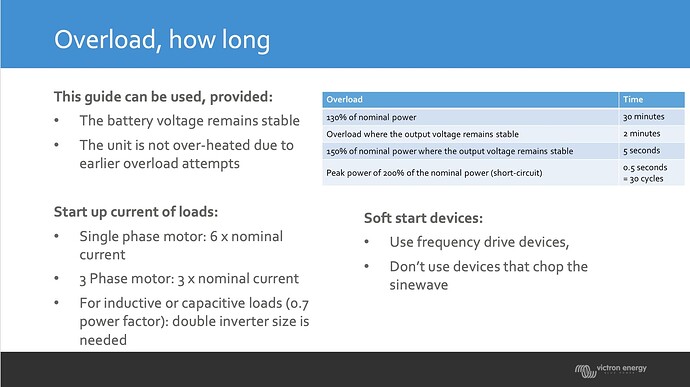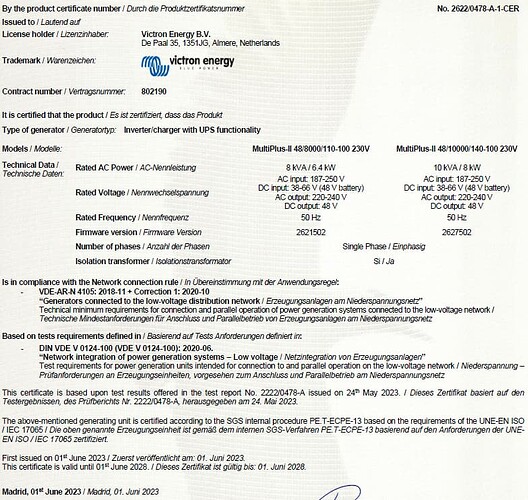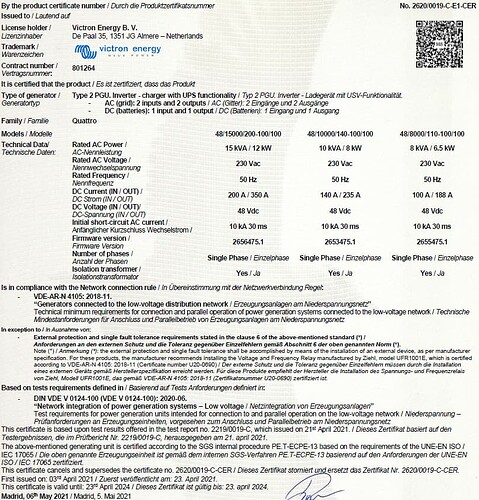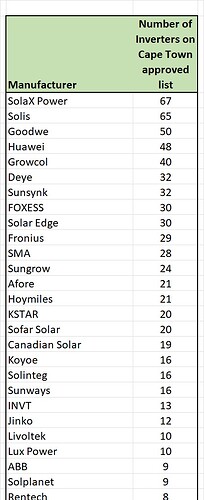They have been active with the later model big Quattros and have recently been certified for the UK.
Again, they appeared pretty late for the party compared to many brands, which upset UK customers.
Victron Multi HS19 3-phase HF HV inverter
I heard about this at the Victron training at The Solar Show Africa (April 2023), and that it would be a “fully-integrated” 3-phase unit with 4 trackers up to 30kW, but couldn’t find more info at the time.
Excuse me if I start a separate thread on this!
We douse them when we plan to or have applied to disconnect from the grid completely (Remove supply transformer).
Yep, that’s my intention.
I just hope this option is still available or Victron has addressed paralleling in their new offering in my 16-month time frame.
Sunsynk 12kW can do 2x rated power for 10s. This is what the victron LF designs can do:
(nominal power is 80% of what plonkster refers to as faceplate power - on a 5kVA multi 5kW = 130% in this table)
Edit: I should probably clarify my point: I’m not trying to sell you a Sunsynk, and I agree that in general HF designs have little to no overload capacity, but I just want to point out that that is not universally the case. (and the SS probably has a couple of caveats linked to that number - like PV has to be present to reach that figure).
Fortunately, here we have an HF Victron vs an LF Victron.
Based on comparative videos and some empirical opinions (not manufacturer claims), I have formed my opinion about the relative starting capability of LF being better than HF designs.
But…
Hopefully, in the future, Victron will evaluate these two products against one another in this particular category, and we’ll get an apples-to-apples comparison and be able to put this to rest.
Well, as an example: I have measured a GoodWe 5048ES deliver double it’s rated current capacity for 60 cycles (without tripping) - so there certainly are things that are not claimed in spec sheets that can be achieved (though probably not guaranteed for all firmware versions).
Many of these things are down to design choices and have a cost impact, so I don’t think that this test point will necessarily put the matter to rest. (unless I’m misinterpreting what you are referring to exactly?)
You are up on me. I haven’t done tests.
I have deployed several PV inverters (varied manufacturers) in other systems, and they all have all delivered what was asked of them. That said, I have never asked them for the starting capability that I envisage needing in my future off-grid system.
In terms of hybrid inverters, I have only used LF Victrons. Again no complaints.
Anecdotally, from various forums, it does seem to be the hybrid inverter/battery combination that seems to be the weak link in the solar chain. In that regard, I trust Victron, and I’m an “if it ain’t broke” kinda guy.
So if it’s going to be Victron for the hybrid, I’d like to be able to ask a technical Victron authority about my intended application and be advised as to which option, HF or LF, is the more suitable inverter.
That’s what I mean about an apples-to-apples comparison.
Victron will make a sale regardless, so marketing hype is unnecessary.
Is this a hypothetical question or does someone have this problem??
“If it ain’t broke” is half of the idiom,“if it ain’t broke don’t fix it”, and it means if something is working adequately, leave it alone.
It is a philosophy, not a question.
This is a question:

Care should be exercised when doing an analysis like that, because your sampling set is heavily biased by the numbers in the pool, of which you likely have no visibility of. (The number of victron inverters in the wild is dwarfed by the number of hybrids). And also, the type of customer for the one set is also probably more likely to post on a forum than the other…
The best would be to get some actual numbers from installers and do a bit of stats on them; forums are the worst place for this sort of analysis IMHO. (I did get some figures from an installer long ago - total set of around 300-400, with a very surprising result, but I don’t really consider the data reliable enough to share).
More than you might imagine. It is not the NRS part that is the holdup. VDE (Germany) always precedes NRS, because NRS is based on the german code, so if you pass VDE, you almost automatically pass NRS too.
And VDE has requirements for three phase systems and the max unbalance allowed which NRS doesn’t have.
You are, of course, correct. The better the data, the better the decision.
I drive Toyotas, and I think I always will.
This is because my first three Toyotas gave me less trouble than three lemons of other brands.
This is a tiny sample to base my decision on (far too small), but yet I made my decision.
I am still happy with that decision decades later.
I accept I may have foregone better vehicles, but I don’t want to kiss a hundred frogs to find a princess if a milkmaid that can keep me fed and warm is amongst the first half-dozen amorous amphibians.
I notice that the 8k and 10k Multiplus IIs got a couple of VDE certifications two weeks ago:
Does this mean that NRS certification is imminent?
This is the 1 Jun 2023 VDE certification doc for the 8 and 19 kVA Multi-IIs:
But there’s also a 6 May 2021 VDE certification, with exceptions, for the Quattro 8, 10 & 15 kVA.
However, no NRS certificates and nothing for any Quattro-II.
Considering that an EasySolar-II GX 5000 has a Multi-II 5000 inside, is it legal for Cape Town installation and feed back?
I hear what you say, but how did the following manufacturers get so many inverters approved, as they would have faced the same process as Victron?
There are 802 inverters on the list, with only 7 from Victron, of which some are not freely available (older models). No Quattros, Quattros-IIs, or 8/10/15 kVA models.
We’re basing an entire business model largely on Victron, but cannot sell to the most progressive renewable energy region in South Africa. Help us out please.
Yes. Explain this to your installer/certifier (they should already know) and register it as a Multiplus-II (which it is).
Complain to your reseller. That’s the right channel.
I posted this on another forum recently:
“But we read in all the media about CoCT’s NEW rules for inverters…
These weren’t new. The press just went on a bender so they could sell more advertising as we all read about this NEWS…”
TTT responded:
"What WAS new was as of 1 Oct 2023, CoCT decided that the only inverters they will allow to connect to THEIR GRID , was NRS certified inverters only.
The Off-grid type installations, installations that “interpreted” the NRS regulations ito how they where connected, inverters that did not have a SABS nor NRS test certificate, was no longer going to be allowed to connect to THEIR GRID as per various reasons supplied by CoCT.
THAT was new."
Did this then remove all the off grid inverters (Axpert etc.) from the list??



